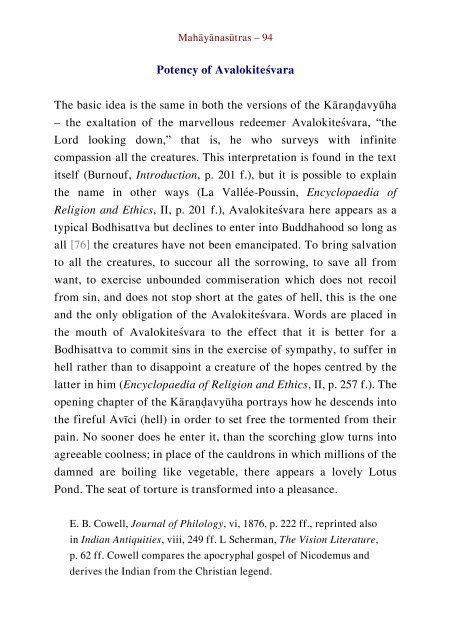Literary History of Sanskrit Buddhism
A study by J. K. Nariman of Sanskrit Buddhism from the Early Buddhist Tradition up to the Mahayana texts proper.
A study by J. K. Nariman of Sanskrit Buddhism from the Early Buddhist Tradition up to the Mahayana texts proper.
You also want an ePaper? Increase the reach of your titles
YUMPU automatically turns print PDFs into web optimized ePapers that Google loves.
Mahāyānasūtras – 94<br />
Potency <strong>of</strong> Avalokiteśvara<br />
The basic idea is the same in both the versions <strong>of</strong> the Kāraṇḍavyūha<br />
– the exaltation <strong>of</strong> the marvellous redeemer Avalokiteśvara, “the<br />
Lord looking down,” that is, he who surveys with infinite<br />
compassion all the creatures. This interpretation is found in the text<br />
itself (Burnouf, Introduction, p. 201 f.), but it is possible to explain<br />
the name in other ways (La Vallée-Poussin, Encyclopaedia <strong>of</strong><br />
Religion and Ethics, II, p. 201 f.), Avalokiteśvara here appears as a<br />
typical Bodhisattva but declines to enter into Buddhahood so long as<br />
all [76] the creatures have not been emancipated. To bring salvation<br />
to all the creatures, to succour all the sorrowing, to save all from<br />
want, to exercise unbounded commiseration which does not recoil<br />
from sin, and does not stop short at the gates <strong>of</strong> hell, this is the one<br />
and the only obligation <strong>of</strong> the Avalokiteśvara. Words are placed in<br />
the mouth <strong>of</strong> Avalokiteśvara to the effect that it is better for a<br />
Bodhisattva to commit sins in the exercise <strong>of</strong> sympathy, to suffer in<br />
hell rather than to disappoint a creature <strong>of</strong> the hopes centred by the<br />
latter in him (Encyclopaedia <strong>of</strong> Religion and Ethics, II, p. 257 f.). The<br />
opening chapter <strong>of</strong> the Kāraṇḍavyūha portrays how he descends into<br />
the fireful Avīci (hell) in order to set free the tormented from their<br />
pain. No sooner does he enter it, than the scorching glow turns into<br />
agreeable coolness; in place <strong>of</strong> the cauldrons in which millions <strong>of</strong> the<br />
damned are boiling like vegetable, there appears a lovely Lotus<br />
Pond. The seat <strong>of</strong> torture is transformed into a pleasance.<br />
E. B. Cowell, Journal <strong>of</strong> Philology, vi, 1876, p. 222 ff., reprinted also<br />
in Indian Antiquities, viii, 249 ff. L Scherman, The Vision Literature,<br />
p. 62 ff. Cowell compares the apocryphal gospel <strong>of</strong> Nicodemus and<br />
derives the Indian from the Christian legend.


















